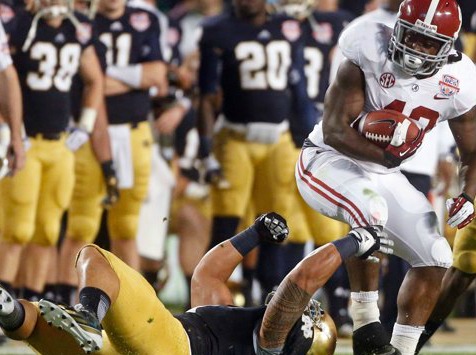From the day it was first announced
and instituted, the Bowl Championship Series system has drawn fire from
virtually every direction. With each round of tweaks and adjustments to the
system, the chorus of detractors seems to grow louder. Never has that phenomenon
been more pronounced than it has over the past two seasons, which have produced
imperfect seasons, but resounding BCS Championship Game victories for the
University of Alabama.
However, an analysis of the wagering trends
reveals that the sharps in Vegas tend to draw the same conclusions about
football teams that the BCS systems does, and no one questions Vegas’ acumen for
sports handicapping.
reveals that the sharps in Vegas tend to draw the same conclusions about
football teams that the BCS systems does, and no one questions Vegas’ acumen for
sports handicapping.
For example, nine 2012-2013 season bowl games featured
matchups between teams ranked in the Top 25 of the BCS standings (the BCS
officially ranks the Top 25 for purposes of bowl participant selection). In
eight of those nine games (89%), the Vegas professionals agreed with the BCS
standings, marking the higher ranked team as the favorite. Of the nine games,
the more highly-ranked team won five, so the BCS standings, generally affirmed
by the betting lines, stood up on their own about 56% of the time.
Of
the other four games in which the lower seed won, one game is notable for what
it tells us about the BCS. That game is the BCS championship game, which
pitted undefeated and top-ranked Notre Dame against one-loss and second-ranked
Alabama. In that game, the lower-seeded team arrived on game day as a 9.5-point
favorite. As predicted, Alabama predictably dismantled
the Fighting Irish by a score of 42-14 to bring home its third crystal football
in four years and earn the label “dynasty.”
Oddly, the BCS complainers
seemed not to take issue with Notre Dame’s selection to participate prior to the
game, owing to its unblemished record; just as in 2011, the complaints were
centered on number 2 – Alabama, though no one really seems to believe that the
teams finishing just behind the Crimson Tide would fare much better than those
who completed the regular season ranked ahead of them. Given the results of the
past two BCS Championship matchups, which Alabama entered as a favorite and won by a
combined scored of 63-14 over previously undefeated and top-ranked opponents, it seems fair
to conclude that the BCS generally produces a game between the two best, if not
evenly matched, teams, and that the large majority of recent complaints about
the BCS as it stands today are based on something other than
a serious examination of its ability to produce a legitimate champion.

COMMENTS
Please let us know if you're having issues with commenting.